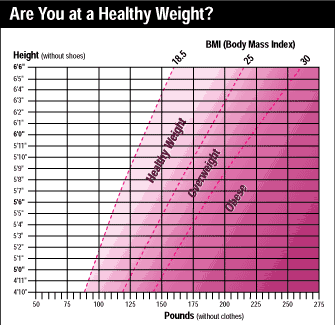
Click Your Topic
 |
 |
 |
 |
How Much Exercise?
Overweight refers to an excess of body weight, but not necessarily body fat. Obesity means an excessively high proportion of body fat. Health professionals use a measurement called body mass index (BMI) to classify an adult's weight as healthy, overweight, or obese. BMI describes body weight relative to height and is correlated with total body fat content in most adults.
To get your approximate BMI, multiply your weight in pounds by 703, then divide the result by your height in inches, and divide that result by your height in inches a second time.
A BMI from 18.5 up to 25 is considered in the healthy range, from 25 up to 30 is overweight, and 30 or higher is obese. Generally, the higher a person's BMI, the greater the risk for health problems, according to the National Heart, Lung and Blood Institute (NHLBI). However, there are some exceptions. For example, very muscular people, like body builders, may have a BMI greater than 25 or even 30, but this reflects increased muscle rather than fat. "It is excess body fat that leads to the health problems such as type 2 diabetes, high blood pressure, and high cholesterol," says Eric Colman, M.D., of the Food and Drug Administration's Division of Metabolic and Endocrine Drug Products.
In addition to a high BMI, having excess abdominal body fat is a health risk. Men with a waist of more than 40 inches around and women with a waist of 35 inches or more are at risk for health problems.
Obesity, once thought by many to be a moral failing, is now often classified as a disease. The NHLBI calls it a complex chronic disease involving social, behavioral, cultural, physiological, metabolic, and genetic factors. Although experts may have different theories on how and why people become overweight, they generally agree that the key to losing weight is a simple message: Eat less and exercise more. Your body needs to burn more calories than you take in.
Body Mass Index Chart

The BMI ranges for adults are shown in this chart. They are not exact ranges of healthy and unhealthy weights. However, they show that health risk increases at higher levels of overweight and obesity. Even within the healthy BMI range, weight gains can carry health risks for adults.
The chart shows heights (without shoes) ranging from 4 feet 10 inches to 6 feet 6 inches on one axis, and weights (without clothes) from 50 pounds to 275 pounds on the other axis. The range of Body Mass Index (BMI) from 18.5 to 30 is shown on the chart so that if you find the point where your height and weight intersect you can determine your BMI.
Healthy Weight: BMI from 18.5 up to 25 refers to healthy
weight.
Overweight: BMI from 25 up to 30 refers to overweight.
Obese: BMI 30 or higher refers to obesity. Obese persons
are also overweight.
Source: Report of the Dietary Guidelines Advisory Committee
on the Dietary Guidelines for Americans, 2000
"3 Habits to Lose Weight: Nutrition, Exercise, Lifestyle"
Information presented on Lose Body Weight website is considered public information. This website is for informational and educational purposes only. The information provided is not intended as a substitute for the care of a doctor or medical professional. If you suspect that you have a health problem, we urge you to contact your physician or local hospital for care. Weight Loss ideas are not proven.